|
|
|
Sort Order |
|
|
|
Items / Page
|
|
|
|
|
|
|
| Srl | Item |
| 1 |
ID:
146123
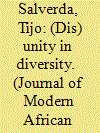

|
|
|
|
|
| Summary/Abstract |
White Africans are particularly associated with the troubles South Africa and Zimbabwe have faced throughout their histories. The story of the Franco-Mauritians, the white elite of Mauritius, and how they have fared during more than forty years since the Indian Ocean island gained independence, is much less known. However, their case is relevant as a distinctive example when attempting to understand white Africans in postcolonial settings. Unlike whites elsewhere on the continent, Franco-Mauritians did not apply brute force in order to defend their position in the face of independence. Yet the society that emerged from the struggle over independence is one shaped by dominant beliefs about ethnicity. As this article shows, despite a number of inverse effects Franco-Mauritians have benefited from this unexpected twist, and part of the explanation for their ability to maintain their elite position lies therefore in the complex reality of ethnic diversity in postcolonial Mauritius.
|
|
|
|
|
|
|
|
|
|
|
|
|
|
|
|
| 2 |
ID:
127847
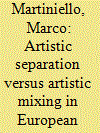

|
|
|
|
|
| Publication |
2014.
|
| Summary/Abstract |
This introductory article discusses the diversification of diversity in Europe. It then looks at the tension between ethnic separation and ethnic mixing in urban Europe in general terms. The next section elaborates on a similar tension in the field of popular arts. Finally, the article presents the main insights of the contributions to the special issue.
|
|
|
|
|
|
|
|
|
|
|
|
|
|
|
|
| 3 |
ID:
090897
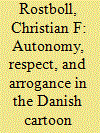

|
|
|
|
|
| Publication |
2009.
|
| Summary/Abstract |
Autonomy is increasingly rejected as a fundamental principle by liberal political theorists because it is regarded as incompatible with respect for diversity. This article seeks, via an analysis of the Danish cartoon controversy, to show that the relationship between autonomy and diversity is more complex than often posited. Particularly, it asks whether the autonomy defense of freedom of expression encourages disrespect for religious feelings. Autonomy leads to disrespect for diversity only when it is understood as a character ideal that must be promoted as an end in itself. If it by contrast is understood as something we should presume everyone possesses, it provides a strong basis for equal respect among people from diverse cultures. A Kantian conception of autonomy can justify the right to freedom of expression while it at the same time requires that we in the exercise of freedom of expression show respect for others as equals.
|
|
|
|
|
|
|
|
|
|
|
|
|
|
|
|
| 4 |
ID:
117909
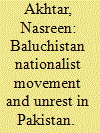

|
|
|
|
|
| Publication |
2011.
|
| Summary/Abstract |
Pakistan is one of the most complex multi-ethnic societies in the developing Islamic world. Each of the ethnic groups that now comprise Pakistan has very distinctive identity, folklore, history and political interests. However, Pakistan's nation builders were not alive to the ethnic question and failed to integrate ethnic groups into a Pakistani nationhood through recognised principles of autonomy, representation and empowerment. Instead, a non-representative, military-led authoritarian system suppressed legitimate regional and ethnic aspirations, relying too heavily on Islam and Pakistan ideology (two nation theory) to forge a sense of common nationhood. It didn't work: since the 1950s there have been four major insurrections against the central government by Baluch nationalists. Although the Baluch national question has its roots in the colonial era, it emerged as a significant political and security issue because an over-centralised and non-representative power system couldn't address the issue of ethnic diversity. Baluchistan is now a hub of interests for regional and major powers.
|
|
|
|
|
|
|
|
|
|
|
|
|
|
|
|
| 5 |
ID:
109998
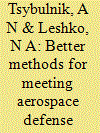

|
|
|
|
|
| Publication |
2011.
|
| Summary/Abstract |
The authors examine a way to improve the air defense information subsystem using concealed radiolocation methods.
|
|
|
|
|
|
|
|
|
|
|
|
|
|
|
|
| 6 |
ID:
152443
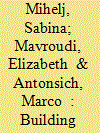

|
|
|
|
|
| Summary/Abstract |
Nation and diversity are often cast in oppositional terms. The present joint intervention explores the limits and possibilities of what we call ‘inclusive nation’, i.e. a nation which embraces rather than expunging diversity. To reflect on this idea, the Loughborough University Nationalism Network (LUNN) organized a symposium, bringing together both academics and relevant stakeholders, to explore both theoretically and practically the feasibility of the inclusive nation. For reason of space, here we present only the theoretical views of academics. While Billig and Yuval-Davis highlight the inherent exclusive thrust of nationalism, Kaufmann and Hearn suggest two distinct ways to move away the traditional understanding of nationalism as a site of singularity, oppression and exclusion. A final rejoinder by Nyhagen pushes the debate further interrogating the boundaries of national belonging.
|
|
|
|
|
|
|
|
|
|
|
|
|
|
|
|
| 7 |
ID:
143644
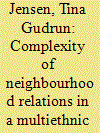

|
|
|
|
|
| Summary/Abstract |
This article examines the nature of coexistence in a multiethnic social housing project in Copenhagen, focusing on neighbourhood relations between majority Danes and ethnic minorities. Despite the general assumption that ethnic majorities and minorities have no neighbourhood relations, this case study reveals multifarious ways of relationship-making. Whereas the residents tended to emphasise separation between ethnic groups, their everyday practices indicated coexistence. These contrasts reflect the residents’ affirmations and contestations of the public national discourse about immigration, social integration and urban life. The variety of neighbourhood practices illustrates a complex social reality characterised by contrasts and ambivalences that represent different orders of identification and interaction and constitute coexisting tendencies of boundary maintenance and conviviality.
|
|
|
|
|
|
|
|
|
|
|
|
|
|
|
|
| 8 |
ID:
134332
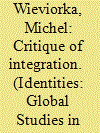

|
|
|
|
|
| Summary/Abstract |
The term ‘integration’ is a category used both in political discourse and in sociological analysis. In political discourse, in the public debate, it has become a magic word which accompanies repression when a political power is unable to deal with major difficulties, particularly in poor neighbourhoods. The so-called ‘models of integration’ are all failing, whether in the United Kingdom after the terrorist attacks of 2005, in the Netherlands after the murder of Theo Van Gogh and Pim Fortuyn, or in France after the riots of 2005. In political and social life, integration is far from able to account for realities or to implement public policies successfully. From a sociological perspective, integration is connected with approaches which are centred on society or the social system, much more than with those that deal with the subjectivity of individuals and their capacity for personal or collective action. This means that integration belongs much more to traditional sociological thinking than to the new contemporary sociological imagination.
|
|
|
|
|
|
|
|
|
|
|
|
|
|
|
|
| 9 |
ID:
140445
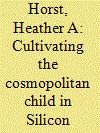

|
|
|
|
|
| Summary/Abstract |
How does cosmopolitanism emerge in regions characterised by diversity and difference? This article examines the ways parents living in Silicon Valley, California seek to realise, maintain and manage ‘cultural and political multiplicities’ in their efforts to create cosmopolitan environments and sociality for their children and families. Grappling with the tension between cultivating academic achievement and cosmopolitan sociability, I explore how parents create opportunities for cosmopolitanism experiences and spaces, moving away from schooling towards education through international travel and philanthropy. The article reflects upon the challenges parents face as they attempt to realise their good intentions, ideas and attitudes to facilitate cosmopolitan sociability in a region where diversity is located in everyday interactions and encounters. I conclude by drawing connections between changing practices and how structural constraints influence parents’ approaches to cultivating cosmopolitanism over time.
|
|
|
|
|
|
|
|
|
|
|
|
|
|
|
|
| 10 |
ID:
164301
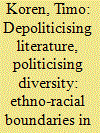

|
|
|
|
|
| Summary/Abstract |
Although still a neglected area, over the years a growing body of sociological research on the position of ethno-racial minorities in Western artistic fields has emerged. With this article we aim to contribute to this research area by focusing on ethno-racial diversity in the Dutch literary field. Through in-depth interviews, we analyse how gatekeepers mobilise specific cultural repertoires and by doing so draw ethno-racial boundaries when discussing acquisition, assessing quality and positioning themselves in the literary field. We argue that literary publishers and other professionals (selectively) employ an ‘old school’ modernist repertoire that especially values the formal aspects of literary products, by which non-white writers and publishers concerned with diversity are often positioned in an identity politics framework. Their work is said to take in a less prestigious ‘political’/’subjective’ position rather than a ‘literary’/‘universal’ one. As such, this paper informs on how gatekeepers’ practices shape the position of non-white authors in the Dutch literary field.
|
|
|
|
|
|
|
|
|
|
|
|
|
|
|
|
| 11 |
ID:
150821
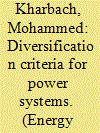

|
|
|
|
|
| Summary/Abstract |
Growing power demand, fuel availability and prices, technology changes, the environmental impacts of energy consumption, the changing regulatory environments and the uncertainties around such elements make the planning for optimal power mix a challenging task. The diversity approach is advocated as a most appropriate planning methodology for the optimal energy mix (Hickey et al., 2010). Shannon Wiener Index (SWI), which is the most cited diversity metric has been used to assess power systems diversity mainly from an energy perspective. To our best knowledge, there is no rigorous justification why energy has been the main variable used in diversification exercises rather than other variables such as capacity. We use a stylized power generation framework to show that diversity based on energy or capacity could lead to different outcomes in terms of vulnerability to fuel exposure, among others. We also introduce a Shannon Wiener Index ratio (SWIR) that we believe captures better the diversity of a power system compared to the standard SWI.
|
|
|
|
|
|
|
|
|
|
|
|
|
|
|
|
| 12 |
ID:
146198
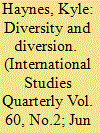

|
|
|
|
|
| Summary/Abstract |
How does a state’s ethnic composition affect its propensity to engage in diversionary conflicts? Recent empirical work examines the political conditions under which domestic unrest compels an embattled leader to initiate conflict abroad. We remain uncertain, however, of what social or demographic characteristics make states particularly prone to diversionary behavior. This article tries to address this gap, examining whether a state’s ethnic structure conditions its leader’s response to domestic discontent. Combining the expansive literatures on ethnic politics and diversionary war yields conflicting expectations here. I find that ethnically fragmented states are significantly more prone to initiating diversionary conflicts, and I show that the greater availability of “conflict opportunities” resulting from transborder ethnic-kin groups, in part, drives this effect. A brief case study illustrates these dynamics.
|
|
|
|
|
|
|
|
|
|
|
|
|
|
|
|
| 13 |
ID:
179525
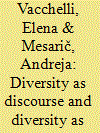

|
|
|
|
|
| Summary/Abstract |
The paper critically examines the way diversity is conceptualised as a dominant discourse and as a paradigm for understanding the present, which has gradually replaced multiculturalism in academic and policy discourse. Using our interviews with third sector practitioners providing mental health support to a wealth of migrant populations in London, the paper offers key examples of how TSOs (Third Sector Organisations) address migrant women’s diverse needs, showing how diversity is practised in the everyday of community groups. This paper’s novelty consists in exposing overlaps and divergences between diversity discourses and diversity practices and its added value lays in the combination of academic and practitioner perspectives in the study of TSOs supporting migrant, refugee and asylum seeker women in London.
|
|
|
|
|
|
|
|
|
|
|
|
|
|
|
|
| 14 |
ID:
125493
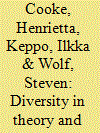

|
|
|
|
|
| Publication |
2013.
|
| Summary/Abstract |
There is clear consensus on the value of diversity as applied to energy systems, with the concept being a central reference for governments, industry and civil society organizations. Given its importance in policy debates, we have sought to explore the specification and measurement of diversity. We show that although conceptualisation of diversity has developed over recent years, along with increasingly elegant mathematical representations, the concept is, at core, subjective and irreducibly context specific. Subjectivity derives from determination of boundaries and the placement of objects into categories, the acts that make assessment of diversity possible. We illustrate this point with an empirical analysis of the diversity of renewable energy generation in the UK over the past century. By applying a range of different indices and classifications to this dataset, we demonstrate that the 'diversity story' told is different in each case. As such we argue that the analysis of diversity must be produced and consumed critically. Attempts to expand, manage, measure or comment upon the diversity of a system, be it an ecosystem, an organization, an economy, or an energy portfolio, demand rigor, reflexivity and, most importantly, transparency.
|
|
|
|
|
|
|
|
|
|
|
|
|
|
|
|
| 15 |
ID:
177003
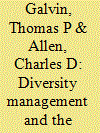

|
|
|
|
|
| Summary/Abstract |
The U.S. Military institutionalized diversity management to ensure equality of treatment and opportunity for members while eliminating discrimination in all its forms. But progress toward diversity goals has been inconsistent. For example, the U.S. Military’s implementation of the repeal of the Don’t Ask, Don’t Tell law was less successful in integrating transgender soldiers. Meanwhile, recent sexual harassment scandals show that progress is similarly fleeting in gender relations. In this article, we argue that while the aims of diversity management are important, they need an accompanying vision of what the future looks like after achieving those aims. The postdiversity vision includes more than the elimination of discriminatory behaviors; it describes what the defense establishment looks like and how it functions when diversity management is no longer required. Expressing this vision allows for more reliable and durable measures of performance and effectiveness of inclusion efforts.
|
|
|
|
|
|
|
|
|
|
|
|
|
|
|
|
| 16 |
ID:
155369
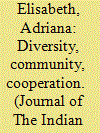

|
|
|
|
|
| Summary/Abstract |
The Indian Ocean Rim Association (IORA) has three main pillars with different focuses and functions. They are namely the Indian Ocean Region-Business Forum (IOR-BF), the Working Group on Trade and Investment (WGTI), and the Indian Ocean Rim-Academic Group (IOR-AG). During 2015–2017, Indonesia has been the Chair of IORA, and successfully implanted a new initiative to help IORA to promote more solid economic integration in the Indian Ocean region. Indonesia hosted the first IORA Summit where the IORA Concord was also first announced in March 2017. It was a very historical moment when Indonesia’s initiative was undertaken during the 20th anniversary of IORA.
|
|
|
|
|
|
|
|
|
|
|
|
|
|
|
|
| 17 |
ID:
165420
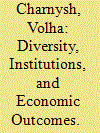

|
|
|
|
|
| Summary/Abstract |
How does an increase in cultural diversity affect state–society interactions? Do institutional differences between heterogeneous and homogeneous communities influence economic activity? I argue that heterogeneity not only impedes informal cooperation but also increases demand for third-party enforcement provided by the state. Over time, the greater willingness of heterogeneous communities to engage with state institutions facilitates the accumulation of state capacity and, in common-interest states, promotes private economic activity. I test this argument using original data on post-WWII population transfers in Poland. I find that homogeneous migrant communities were initially more successful in providing local public goods through informal enforcement, while heterogeneous migrant communities relied on the state for the provision of public goods. Economically similar during state socialism, heterogeneous communities collected higher tax revenues and registered higher incomes and entrepreneurship rates following the transition to the market. These findings challenge the predominant view of diversity as harmful to economic development.
|
|
|
|
|
|
|
|
|
|
|
|
|
|
|
|
| 18 |
ID:
123190
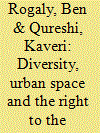

|
|
|
|
|
| Publication |
2013.
|
| Summary/Abstract |
Using three vignettes of the same physical space this article contributes to understanding of how the right to the city is contested in provincial England in the early twenty-first century. Oral history and ethnographic material gathered in Peterborough between 2010 and 2012 are drawn on to shed new light on the politics of diversity and urban space. This highlights the multiple place attachments and trans-spatial practices of all residents, including the white ethnic majority, as well as contrasting forms of active intervention in space with their different temporalities and affective intensities. The article carries its own diversity politics, seeking to reduce the harm done by racism through challenging the normalisation of the idea of a local, indigenous population, left out by multiculturalism. It simultaneously raises critical questions about capitalist regeneration strategies in terms of their impact both on class inequality and on the environment.
|
|
|
|
|
|
|
|
|
|
|
|
|
|
|
|
| 19 |
ID:
171811
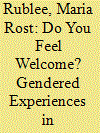

|
|
|
|
|
| Summary/Abstract |
Unlike in the broader field of international relations, relatively little research on gender representation and gendered experiences exists within the subfield of security studies. This article begins to fill that gap by sharing the results of a 2019 survey of members of the International Security Studies Section (ISSS) of the International Studies Association (ISA). The survey results show striking gender differences in members’ experiences, with women more likely than men to describe ISSS as “insular,” “clubby,” and an “Old Boys’ Network”; more likely to report experiences of hostility and exclusion; and more likely to believe that diversity initiatives are needed. Our analysis reveals that women in the ISSS report (1) harassment, (2) negative experiences participating in various section activities, (3) more significant barriers to attending and being selected for the section's ISA program, and (4) a sense of feeling unwelcome at ISSS meetings, all at higher rates than male respondents.
|
|
|
|
|
|
|
|
|
|
|
|
|
|
|
|
| 20 |
ID:
151740
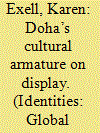

|
|
|
|
|
| Summary/Abstract |
After a brief discussion of the rapidly changing international museum world in Doha, this response piece engages with Peggy Levitt’s arguments around cultural armature and the role of museums in managing a city’s diversity, focusing on Doha, Qatar. Given the dominant migrant foreign population (88 per cent) and the careful protection of national citizenship in Qatar, the role of museums in managing diversity presents a situation that contrasts with older nation states: rather than encouraging inclusion, the museums in Qatar and the Arabian Peninsula states play a role in constructing and protecting a pure concept of national identity on behalf of a minority citizen population that deliberately fails to embrace any notion of diversity. This piece uses brief case studies to illustrate this process of exclusion, expanding Levitt’s original argument.
|
|
|
|
|
|
|
|
|
|
|
|
|
|
|
|
|
|
|
|
|